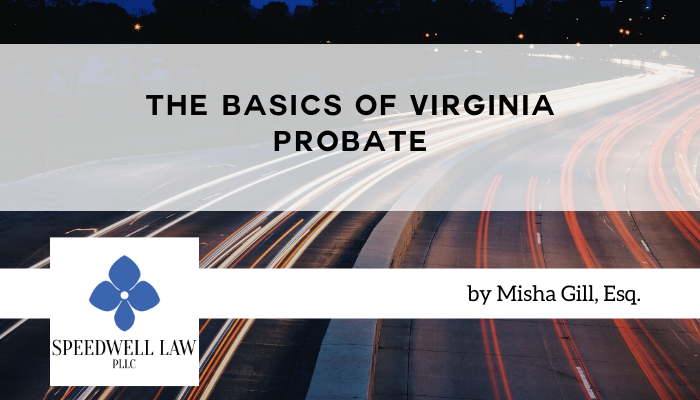
The Basics of Virginia Probate
Probate is the court-supervised process by which your last will & testament (“Will”) is validated after you pass away. Once your Will has been validated by a Virginia probate court, your estate (the property you leave behind) can be distributed to your heirs.
The Virginia probate process can be broken down into 6 basic stages:
- The probate court validates your Will if there is one
- The probate court appoints an executor to oversee your estate
- The executor officially notifies your heirs of your passing
- The executor gathers and takes inventory of your estate’s assets and liabilities
- The executor pays your debts and final taxes
- The executor distributes the remaining assets to your heirs
The Probate Court Validates Your Will if There is One
Your Will must be probated in the state and county where you pass away. However, if you owned real estate in another state, then another probate process must be opened in the state where the property is located.
However, if the value of the estate you leave behind is less than $50,000 (Va. Code Ann. § 64.2-601.), or if the estate is comprised of only real estate and you left no Will (Va. Code Ann. § 64.2-601.), your inheritor’s may be able to bypass probate completely and take ownership of your assets simply by completing a document called a “small estate affidavit”.
The Probate Court Appoints an Executor to Oversee Your Estate
The probate court must formally appoint an executor to oversee your estate. This can be a person you named as your personal representative in your Will. If you did not designate a personal representative in your Will, then the court will appoint an executor. The executor will then be granted the legal authority to handle the affairs of your estate.
The Executor Notifies Your Heirs of Your Passing
Your executor must send written notice of your passing to your heirs and other interested parties within 30 days of being appointed executor, or from the date probate was opened. This typically means sending notice to your surviving spouse, children, heirs at law, and any beneficiaries named in your Will.
The Executor Gathers and Takes Inventory of Your Estate’s Assets and Liabilities
Your executor will make a list of all of your assets and liabilities as they existed at the time of your passing. However, only assets that were not structured to avoid probate will be counted as part of your estate (“non-exempt” assets). Your executor must then. Amongst other things:
- Have your non-exempt assets appraised for their fair market value at the time of your death;
- Determine how these assets are titled; and
- File an inventory of your estate with the Commissioner of Accounts (“Commissioner”) for your probate estate.
The Executor Pays Your Debts and Taxes
When a creditor files a claim against your estate, your executor will pay that debt. Your executor will also file your final tax returns and pay any state or federal taxes owed.
The Executor Distributes the Remaining Assets to Your Heirs
Before distributing your remaining assets, your executor must file a final accounting with the Commissioner and have the distribution approved. At the closing of your estate, the Commissioner will also approve the fees to be paid to the executor and any attorney(s) involved.
What Happens If You Die Without a Will?
All of your non-exempt assets must pass through probate, regardless of whether you died with a Will in place (“testate”) or without a Will in place (“intestate”). Non-exempt assets can generally be defined as any property (real or personal) that were titled in your own name or as a joint tenant in common at the time of your death.
Exempt assets can be thought of as those assets that you owned as a joint tenant with rights of survivorship, a tenant by the entirety (e.g. with your spouse), or in trust, as well as, any assets that pass directly to a named beneficiary by way of a Pay-On-Death or Transfer-On-Death designation (e.g. bank accounts, investment accounts, retirement accounts, etc.).
If you die testate, your non-exempt assets will be distributed to your heirs according to instructions left in your Will. However, if you die intestate, your estate will be distributed to your heirs and beneficiaries in accordance with Virginia’s intestate succession statutes.
The Virginia intestate succession statutes supply default rules for who will inherit what from a person’s estate when they die intestate. Under Virginia code 64.2-200 and 64.2-201, the order of inheritance is as follows:
- Your spouse and children first; then
- Your parents if you have no surviving spouse or children; then
- Your siblings if have no surviving spouse, children, or parents; and finally
- If you have no surviving spouse, children, parents, or siblings, your grandparents, aunts and uncles, cousins, etc.
Contact an Experienced Virginia Probate and Estate Planning Attorney
Probate can be a complicated, time consuming, and expensive process. Hence, many people who wish to spare their loved ones the cost and burden of probate, and to have their assets distributed to their loved one in a more expeditious manner, take steps to avoid probate.
For more information on the Virginia probate process and what measures you can implement for probate avoidance, schedule a free consultation with Speedwell Law. We focus our practice on Virginia estate planning and trust law.
Contact our law firm at (703) 553-2577 or [email protected].
The information on this site is for general informational purposes only. The information presented in this site is not legal advice or a legal opinion. You should seek the advice of legal counsel of your choice before acting upon any of the information in this site.





